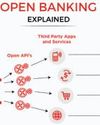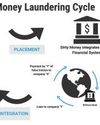
The Indian banking sector is on the cusp of a transformation. FinTech startups are revolutionizing the industry with innovative products, seamless digital experiences, and a culture of agility. But this disruption extends beyond just technology.
Introduction:
The vitality of a country's economy lies at the core of its growth and prosperity, with various factors contributing to its development. Among these factors, the banking sector emerges as a pivotal force, facilitating the expansion and stability of the national economy. Through the efficient allocation of savings into productive ventures, the banking system assumes a vital function in nurturing economic growth and development. In India, the banking structure comprises commercial banks and co-operative banks, each playing distinct yet complementary roles in the financial ecosystem. Commercial banks, further categorized as scheduled and non-scheduled, encompass private, public, branches of foreign banks and regional rural banks, collectively providing to the diverse financial needs of the populace.
Central to the functions of these banks is the mobilization of deposits and the provision of loans, pivotal for stimulating economic activity. While deposit-taking carries minimal risk, as banks are obligated to refund public funds upon request, lending involves inherent risks, with the possibility of borrowers defaulting on repayments, leading to the accumulation of non-performing assets (NPAs). NPAs, characterized by assets failing to generate revenue for the bank, primarily consist of loans or advances in default or arrears. Default occurs when borrowers fail to meet their contractual obligations, jeopardizing the financial health and profitability of banks. As such, the management and mitigation of NPAs are critical for ensuring the stability and sustainability of the banking sector, thereby bolstering the broader economic landscape.
This story is from the November 2024 edition of BANKING FINANCE.
Start your 7-day Magzter GOLD free trial to access thousands of curated premium stories, and 9,000+ magazines and newspapers.
Already a subscriber ? Sign In
This story is from the November 2024 edition of BANKING FINANCE.
Start your 7-day Magzter GOLD free trial to access thousands of curated premium stories, and 9,000+ magazines and newspapers.
Already a subscriber? Sign In

Combating Cyber Threats in Banking: Prevention, Detection, and Response Mechanisms
In the digital age, the Banking sector has undergone a remarkable transformation, leveraging technology to offer seamless and efficient services to customers across the globe.

Creating a Winning Sales Pitch for SIPs and Mutual Fund Products
In the competitive world of financial services, effectively communicating the value of Systematic Investment Plans (SIPs) and mutual fund products is crucial for success.

Banking in the Era of "Data Privacy": Impact of Digital Personal Data Protection Act (DPDPA) on the Banking Industry
In modern world, data is a valuable asset which helps in the revenue generation process of a company/organization.

Opportunities and Risk for Traditional Banks in Embracing Open Banking
Technology has simplified our lives by making the processes easier and integrating into our daily routines.

RBI CIRCULAR
Coverage of customers under the nomination facility

Decoding Financial Crime of Money Laundering
This article is about the definition & concept of financial crime of money laundering.

The Future of Mutual Funds in the Digital Era: Trends and Challenges
The mutual fund industry has witnessed a significant transformation over the past decade, driven by rapid advancements in technology and the proliferation of digital platforms.

Future of BankingBlockchain Technology
Blockchain banking is a new technology in India, but it's gaining traction due to its worldwide success in finance and other sectors.

Legal News
SC: Parents Can Be Legally Compelled to Provide Education Money to Daughter

Economic Value of Equity (EVE) Demystified
In the realm of finance and economics, the concept of equity plays a pivotal role in assessing the health and potential of businesses, projects, and investments.
